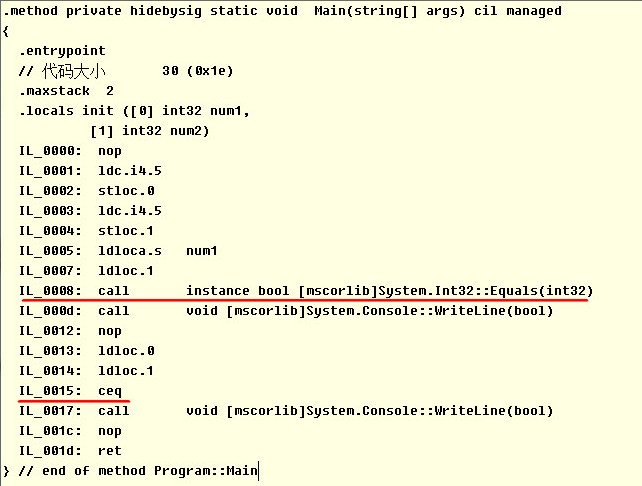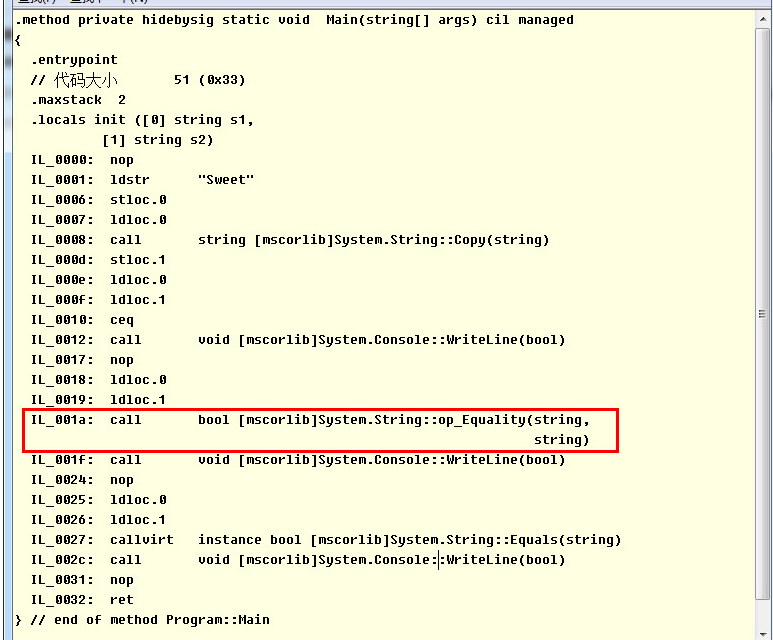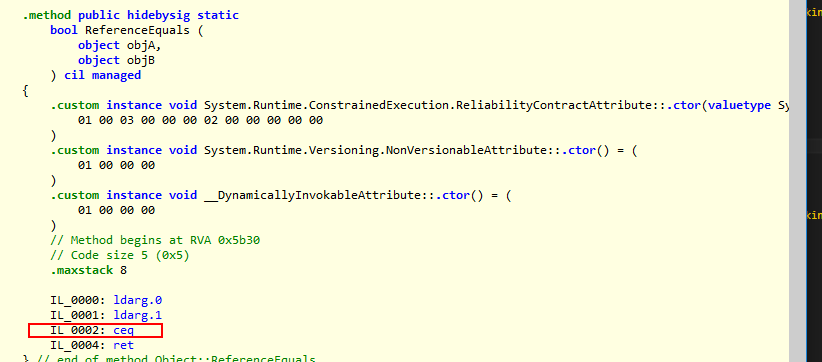c#等于
不重载 operator ==(int、float、.... object等)
class Program { static void Main(String[] args) { int num1 = 5; int num2 = 5; Console.WriteLine(num1.Equals(num2)); Console.WriteLine(num1 == num2); } }
public struct Int32: IComparable, IFormattable, IConvertible, IComparable<int>, IEquatable<int>

如果您以前从来没有接触过IL指令,不过没关系,在这里您不需要理解所有的指令,我们只是想了解这两个比较方式的差异。
您可以看到这样一行代码:
1 IL_0008: call instance bool [mscorlib]System.Int32::Equals(int32)
在这里调用的是int类型Equals(Int32)方法(该方法是IEquatable<Int>接口的实现)。
现在再来看看使用==运算符比较生成的IL指令:
1 IL_0015: ceq
您可以看到,==运行符使用的是ceq指令,它是使用CPU寄存器来比较两个值。C#==运算符底层机制是使用ceq指令对基元类型进行比较,而不是调用Equals方法。
如果重载 operator ==(string等):重载相当于添加了一个比较的静态方法
class Program { static void Main(String[] args) { string s1 = "Sweet"; string s2 = String.Copy(s1); Console.WriteLine(ReferenceEquals(s1, s2)); Console.WriteLine(s1 == s2); Console.WriteLine(s1.Equals(s2)); } }
sealed class String : IComparable, ICloneable, IConvertible, IEnumerable, IComparable<string>, IEnumerable<char>, IEquatable<string>

在这里我们没有看到ceq指令,对String类型使用==运算符判断相等时,调用的是一个op_equality(string,string)的新方法,该方法需要两个String类型的参数,那么它到底是什么呢?答案是String类型提供了==运算符的重载。在C#中,当我们定义一个类型时,我们可以重载该类型的==运算符。所以我们重载操作符号也是一样。
System.Object provides the following methods:
public static bool ReferenceEquals(object objA, object objB) { return objA == objB; } public static bool Equals(object objA, object objB) { return objA == objB || (objA != null && objB != null && objA.Equals(objB)); } public virtual bool Equals(object obj) { return RuntimeHelpers.Equals(this, obj); }

string(不是继承自object) like this:
public static bool operator ==(string a, string b)
{
return Equals(a, b);
}
public static bool operator !=(string a, string b)
{
return !Equals(a, b);
}
public static bool Equals(string a, string b)
{
if ((object)a == b) //转化为obejct==object,进行一次装箱操作
{
return true;
}
if (a != null && b != null)
{
if (a.Length != b.Length)
{
return false;
}
return EqualsHelper(a, b);
}
return false;
}
private unsafe static bool EqualsHelper(string strA, string strB)
{
int num = strA.Length;
fixed (char* ptr = &strA.m_firstChar)//Represents a character as a UTF-16 code unit(两字节)
{
fixed (char* ptr3 = &strB.m_firstChar)
{
char* ptr2 = ptr;
char* ptr4 = ptr3;
while (num >= 12)
{
if (*(long*)ptr2 != *(long*)ptr4)
{
return false;
}
if (*(long*)(ptr2 + 4) != *(long*)(ptr4 + 4))
{
return false;
}
if (*(long*)(ptr2 + 8) != *(long*)(ptr4 + 8))
{
return false;
}
ptr2 += 12;
ptr4 += 12;
num -= 12;
}
while (num > 0 && *(int*)ptr2 == *(int*)ptr4)
{
ptr2 += 2;
ptr4 += 2;
num -= 2;
}
return num <= 0;
}
}
}
We can use like this....
Use object.ReferenceEquals(person1, null) instead of the == operator:
public static bool operator ==(Person lhs, Person rhs) {
bool leftNull = System.Object.ReferenceEquals(lhs, null);
bool rightNull = System.Object.ReferenceEquals(rhs, null);
if (leftNull || rightNull)
{
return leftNull && rightNull;
}
// Return true if the fields match: return lhs.Equals(rhs); } public static bool operator !=(Person lhs, Person rhs) { return !(lhs == rhs); }



 浙公网安备 33010602011771号
浙公网安备 33010602011771号